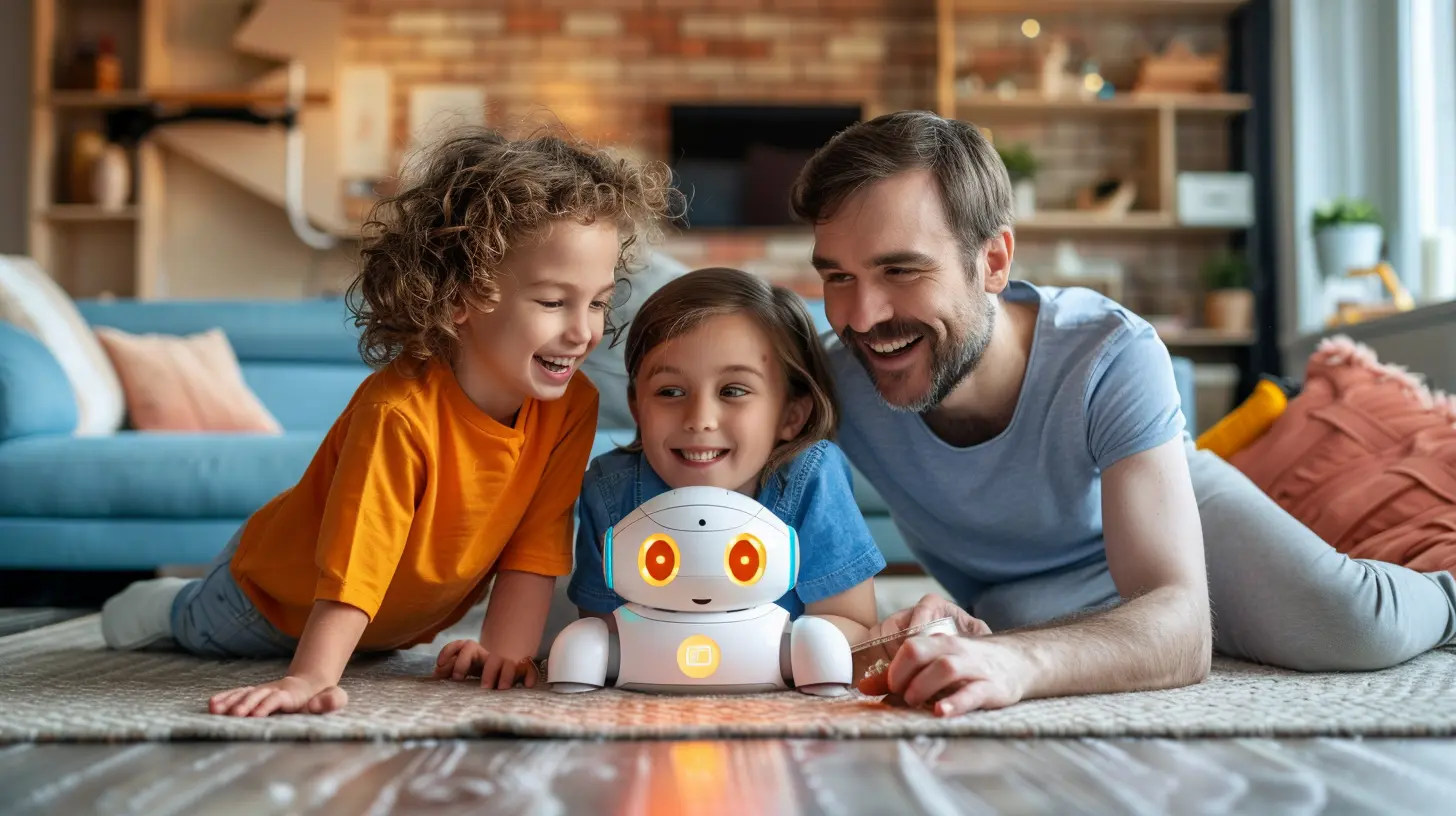Is Voice Technology Beneficial for Child Development?
9 August 2025
Voice technology has slowly but surely found its way into our homes. From asking Alexa to play bedtime lullabies to having Siri answer a curious kid’s questions, it's become part of our children's daily experiences.
But is voice technology just a cool convenience—or could it actually help in nurturing your child's cognitive and communication skills?
Let’s dive into this fascinating topic and figure out whether voice tech is a helping hand in child development or just another flashy gadget.
What Exactly Is Voice Technology?
Think of voice technology as the ears and voice of a device. It allows machines to interpret spoken language and respond appropriately. You've heard of smart assistants like Alexa, Siri, and Google Assistant, right? These are powered by voice recognition systems.But it doesn't stop there. Voice tech is also part of toys, reading apps, educational tools, and even speech therapy programs. It’s like giving a toy or device the ability to talk—and listen—like a real person.
How Voice Technology Interacts With Kids
Kids are naturally curious creatures. Ask any parent—kids question everything. And that curiosity doesn't clock out at 5 PM. Voice technology offers immediate answers without the wait.Let’s say your child wants to know, “Why is the sky blue?” Instead of flipping through books or Googling it, they ask Siri or Alexa. Bam! Instant explanation. It keeps the learning process spontaneous and fun.
Also, voice tech doesn’t get tired or lose patience. If your child wants to hear the same song or story ten times in one day—no problem.
The Upside: Voice Tech’s Benefits for Child Development
Now, let’s dig into the juicy stuff. What exactly can voice technology do for a child’s development? A lot, actually.1. Enhances Verbal Communication Skills
Kids interact with voice assistants using speech, not typing. This naturally encourages them to speak clearly and structure questions properly. For younger children, this is golden—they’re practicing pronunciation, vocabulary, and sentence formation.And unlike screen-based apps, voice tech supports auditory learning. That’s great for kids who absorb better by listening than reading.
2. Encourages Curiosity and Independent Learning
Think of voice tech as a 24/7 tutor. If your child hears a new word or concept, they can hop on a smart assistant and explore it on their own.This kind of instant feedback motivates kids to stay curious, ask more questions, and become more independent learners. It's like having a never-tired encyclopedia that talks back!
3. Boosts Confidence in Social Interaction
When a child learns to speak to technology and gets a response, it reinforces their self-esteem. They feel heard—literally. That confidence can spill over into real-life interactions with teachers and peers.Kids who are shy or have speech difficulties often use voice tech as a stepping stone to becoming more verbal.
4. Supportive Tool for Children With Learning Differences
Voice technology is a game changer for kids with ADHD, dyslexia, or speech impairments. Tools like voice-to-text give them a way to express themselves without the pressure of writing or spelling.Apps tailored for speech therapy also use voice recognition to correct pronunciation and encourage repetition in a fun, interactive way.
5. Makes Routine Tasks Fun and Educational
Need help setting a bedtime routine? Alexa can help with that. Kids can ask their assistant to set timers for brushing teeth, read a bedtime story, or play calming music before sleep.By turning routines into interactive dialogues, kids are more likely to follow through (and parents get a little break—bonus!).
The Other Side of the Coin: Risks and Concerns
Alright, all that sounds amazing, right? But we're not throwing a digital parade just yet. Like with any technology, there are a few caveats to consider.1. Over-Reliance on Technology
There’s a fine line between using voice tech as a tool and letting it become a crutch. If kids start depending solely on voice assistants for answers, they might miss out on developing critical thinking or problem-solving skills.Kids also need to learn how to find information manually—from books, real conversations, or even just figuring things out on their own.
2. Limited Conversation Range
Let’s face it—while smart assistants are impressive, they’re not exactly conversational geniuses. Their responses are often predetermined and shallow.This might limit a child’s ability to engage in deep, meaningful conversations and could even impede their understanding of social language cues.
3. Privacy and Data Collection
Here’s the elephant in the room: privacy. These devices are always “listening” for that wake word. That raises concerns about what data is being collected and how it’s being used.Parents need to be mindful of device settings, voice history, and terms of service. You don’t want your child’s voice data ending up in some tech company’s database with no clue how it’s being used.
4. Screenless Doesn’t Mean Harmless
Voice tech might be screen-free, but it still counts as tech time. Overexposure can still mess with sleep patterns, reduce attention spans, and sideline good old-fashioned play.Balance is key. Voice tech is a tool—not a replacement for human interaction or outdoor adventures.
Tips for Making Voice Tech a Positive Influence
So how do we make sure voice tech nourishes, not hinders, child development? Here are a few parent-approved strategies:✅ Use It To Spark Conversations
Don’t just let your child ask questions and walk away from the answer. Stretch it out! “Hey, why do you think the sky looks blue in pictures but different in real life?” Let voice tech be the conversation starter—not the full story.✅ Set Boundaries and Time Limits
Just like you'd limit screen time, voice tech deserves some boundaries too. Create "tech-free" hours where the focus is on human interaction, family games, or imaginative play.✅ Encourage Active Participation
Choose apps or games that require your child to respond, think, or explain their answers. Passive listening? Not so great. But active dialogue? That’s where the magic happens.✅ Monitor and Customize Settings
Get into the device's settings and tweak them to protect your child's privacy. Disable purchasing, check the data usage settings, and make sure inappropriate content is filtered out.✅ Combine With Other Learning Tools
Voice tech is amazing—but it shines brightest when used alongside books, educational toys, and good old-fashioned parent-child talks. Mix it up for a well-rounded learning experience.Future of Voice Technology in Early Education
The potential is huge. We're already seeing classrooms integrate voice tech for reading assistance, language learning, and special education support.Imagine smart voice tutors giving personalized lessons based on a child's unique pace and style. Or multilingual assistants helping children become fluent in more than one language. The future is exciting—and it’s just getting warmed up.
Of course, this only works if developers and educators continue to prioritize child-friendly design, ethical use, and privacy.
Final Thoughts: Should You Embrace It?
So, is voice technology beneficial for child development?The short answer: Yes—but with a pinch of caution.
Used thoughtfully, it can enhance language skills, boost confidence, and make learning more interactive and fun. But like any parenting tool, it's not about replacing human connection—it's about enhancing it.
Think of voice technology as a sidekick in your parenting journey. It can whisper bedtime stories, answer “why” questions you don't have the energy for, and even help your child learn new skills. But the real hero? That’s still you, guiding them with love, boundaries, and real conversations.
So go ahead—let Alexa tell a knock-knock joke during dinner. Just don't let her take over the table talk.
all images in this post were generated using AI tools
Category:
Tech And KidsAuthor:

Noah Sawyer
Discussion
rate this article
1 comments
Lincoln Tucker
Voice technology can enhance learning and communication skills, supporting overall child development effectively.
August 23, 2025 at 4:57 AM

Noah Sawyer
Absolutely! Voice technology offers interactive learning experiences that can boost communication skills and foster holistic child development.


